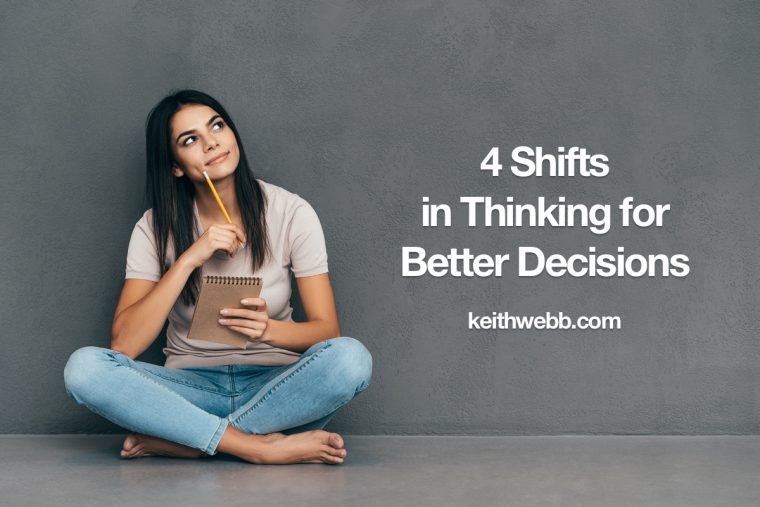Much of education, be it in school, church, home, or around the office, is based on the assumption that if people have the right information they will make good decisions. More information does not produce better decisions, shifts in thinking does.

Many people I coach or who attend our workshops believe that they are missing that one piece of information or know-how that will be the key to unlock the door to their success.
One of the axioms of coaching is: the answer is inside. While it’s true that we need to learn new things and acquire new knowledge, many of our problems can be handled by gaining new perspective on the information we already have.
More than this, unless we shift our perspective, we might see the right information in wrong ways.
Here’s an example:
When Covid19 hit, our family vacation to Hawaii was up in the air. Lori and I didn’t know what to do. So we researched.
We wanted to scuba dive, so we considered going to Mexico, California, and Florida. None of which would be possible. So disappointing. I guess we wouldn’t have a family vacation this year.
The assumption that if people have the right information they will make right decisions is wrong. People are much more complex than that. Share on X4 Shifts In Thinking
People are complex. Even with the right information we’re not rational, logical, or predictable – except in our unpredictability. Take a look at these 4 things that affect our thinking, and our decision-making. Then, we’ll revisit the vacation story.
- Emotions. Ignore emotions to your own detriment. They override our Reason, whether they are reasonable or not. Emotions often convince Reason that they are reasonable. It’s said that 80% of our decisions are emotional. We don’t like to acknowledge this causation, so we call it “intuition” instead. We need to explore the emotions we are feeling or they will override the information we have.
- (Lack of) Wisdom. Take knowledge and add insight to understand the meaning and implications of that knowledge, and you get Wisdom. Wisdom comes from reflection with discernment on the by-products of knowledge applied in life experiences – yours or someone else’s. Wisdom must be applied based on culture, context, and personality, which needs a Wisdom of its own. Information alone isn’t enough, we have to have the wisdom to know which information is important and what to do with it.
- Bias. The human mind operates efficiently, not rationally. Our minds focus on information that confirms our preconceptions (Confirmation Bias), values what we have more than what we don’t (Endowment Effect), takes the safer lower return instead of the riskier higher return option (Risk Aversion), and believes if we’ve been unlucky up to now, our lucky break is just around the corner (Logical Fallacy), just to name a few. It takes reflection and hard work thinking to catch our biases.
- Beliefs. Perhaps this is simply our biases in action, but we will throw Reason out the window if it threatens our long-standing beliefs about the the world, people, or ourselves. The person we believe is lazy, selfish, or even angelic, remains so in our view despite evidence to the contrary. Ignoring or discounting information is much less mentally taxing than reassessing our beliefs. We must hold the tension between our belief and seemingly contradictory information long enough to explore where our thinking needs to adjust.
We Could See the Answer After our Thinking Shifted
Back to my vacation story. We acknowledged our disappointments, and the many varied emotions around how Covid19 has changed our lives.
Our thinking didn’t include any local options because of our beliefs and biases about the vacation we wanted (beach and scuba diving), and the emotional disappointment of no Hawaii.
Reexamining our thinking, we were able to see how local possibilities could meet our larger family vacation goals. We knew about a beach house on Whidbey Island, an hour north of us. No scuba diving, but plenty of beach.
Until we get at the emotions, biases, and beliefs we hold, we will not be able to effectively use the information we already have. Share on XThe Whidbey Island beach house we already knew about suddenly appeared in our thought processes. We stayed at that beach house and had a memory-filled vacation.
My organization used the same process to redesign our training strategy after Covid19 hit. As often as not, we found we already knew the ways forward once we shifted our thinking.
Until we get at the emotions, biases, and beliefs we hold, we will not be able to effectively use the information we already have.
As you process decisions, use coaching questions to probe your emotions, biases, and beliefs.
Share this article or leave a comment below.


Please note: I reserve the right to delete comments that are offensive or off-topic. You own your comments but give me permission to use them. See My Comments Policy. Read my Permissions Policy to know how you can use my posts.